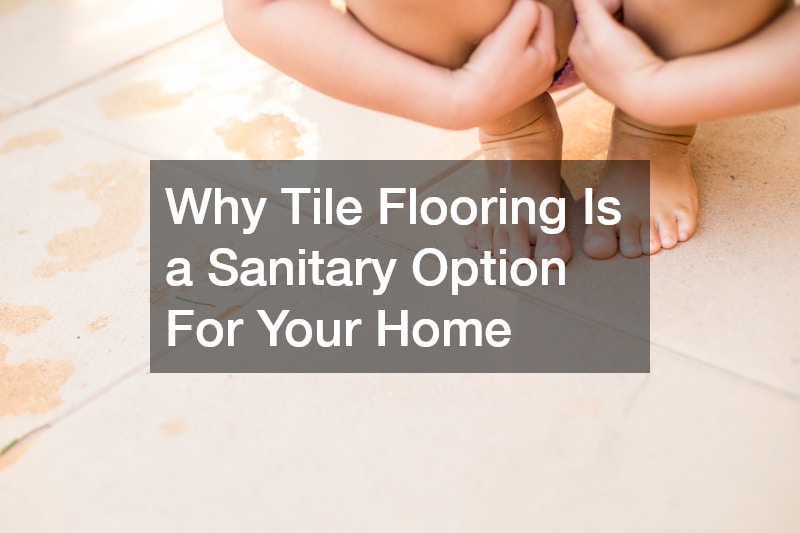1. Non-Porous Surface Prevents Bacteria and Germ Build-Up
One of the most compelling reasons tile flooring is a sanitary option is its non-porous surface. Unlike carpets, which can absorb dirt, dust, pet dander, and liquids, tiles are designed to resist moisture and stains. This means that any spills or accidents can be wiped up easily without soaking into the surface. The non-absorbent nature of tile prevents bacteria, mold, and mildew from taking root, which can be a concern with porous materials.
In kitchens and bathrooms, where spills are common, tile flooring provides a hygienic barrier that keeps harmful bacteria and germs at bay. Whether you’re dealing with food splatters, soap scum, or water from a shower, tile is easy to clean and sanitize with minimal effort. By avoiding the accumulation of moisture and dirt, tile ensures a healthier, cleaner home environment.
2. Easy to Clean and Maintain
Tile floors are incredibly easy to clean and maintain, which is a significant advantage over other types of flooring. A quick sweep or vacuum can remove dirt and debris, and when it’s time for a deeper clean, all you need is a mop and some mild cleaning solution. The smooth surface of tile also ensures that no dirt is trapped in the fibers, as is the case with carpeting.
For homeowners with children or pets, tile flooring is particularly beneficial. Pets track in dirt, mud, and germs from the outdoors, and children often spill drinks or food. With tile, cleaning up after these messes is a breeze, and there’s less worry about the buildup of allergens, which can trigger asthma or allergies. For those who suffer from respiratory issues, a tile floor can make a noticeable difference by keeping the air in your home cleaner and fresher.
3. Hypoallergenic Properties
One of the biggest health benefits of tile flooring is its hypoallergenic properties. Unlike carpets, which can trap dust, allergens, and pet dander, tile provides a surface that doesn’t hold onto these particles. Tile floors are ideal for individuals who suffer from allergies, asthma, or other respiratory issues. Because tile doesn’t trap dust or debris, it helps keep the air in your home cleaner and free from irritants that could exacerbate health conditions.
This is particularly important in areas of the home that are more prone to dust, such as bedrooms, living rooms, or offices. Even in high-traffic areas like hallways and entryways, tile helps maintain a cleaner, more allergen-free environment. By installing tile, you can breathe easier knowing that your flooring isn’t contributing to allergy flare-ups or respiratory problems.
4. Durability and Long-Term Cleanliness
Tile flooring is incredibly durable and, when installed correctly by professional tile setters, can last for decades with little maintenance. Unlike carpets, which wear down over time and can start to look dingy and stained, tile retains its appearance and sanitary qualities for much longer. This durability means that you won’t need to replace your flooring as frequently, helping to maintain a clean and tidy home for years to come.
The long-lasting nature of tile also helps prevent the accumulation of dirt or grime that often occurs when flooring becomes worn or damaged. When installed properly by experienced tile setters, tiles form a tight, secure bond with the substrate, reducing the risk of gaps or cracks where dirt could hide. Hiring a bathroom remodel contractor can prevent these germs from spreading.
5. Resistant to Mold and Mildew
Another important sanitary advantage of tile flooring is its resistance to mold and mildew. In areas like bathrooms, basements, or kitchens, where moisture levels tend to be higher, mold and mildew can become a significant concern for homeowners. Tile’s water-resistant properties prevent moisture from seeping into the floor and encourage fast drying, which minimizes the potential for mold growth.
Ceramic and porcelain tiles are particularly effective in areas exposed to water or humidity. When properly sealed, grout lines are also less likely to absorb moisture and become a breeding ground for bacteria or mold. Tile setters typically recommend sealing the grout after installation to further protect it from staining and moisture absorption, ensuring your floors remain clean and sanitary for years.
6. Versatility in Design Without Sacrificing Hygiene
Tile flooring also offers a wide variety of styles, colors, and finishes, so homeowners don’t have to sacrifice aesthetics for cleanliness. Whether you prefer the sleek, modern look of polished porcelain or the rustic charm of terracotta, there’s a tile option that fits your style while still offering the sanitary benefits that make tile so desirable.
The versatility of tile makes it suitable for nearly every room in the home. From kitchens and bathrooms to living rooms and hallways, tile’s durability, ease of maintenance, and resistance to moisture and stains make it an excellent choice. Additionally, tile can be used with radiant floor heating systems, providing warmth without compromising hygiene, making it a great option for homes in cooler climates.
7. Increases Home Value
Finally, tile flooring can increase the value of your home, especially if it is professionally installed by experienced tile setters. Tile is often seen as a premium material due to its aesthetic appeal, long-term durability, and hygienic properties. Homes with clean, well-maintained tile flooring can attract potential buyers who are looking for low-maintenance, hygienic living spaces.
.

